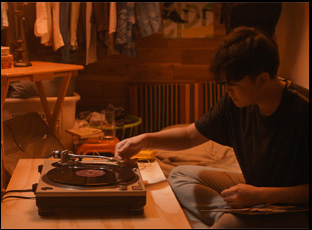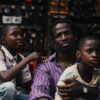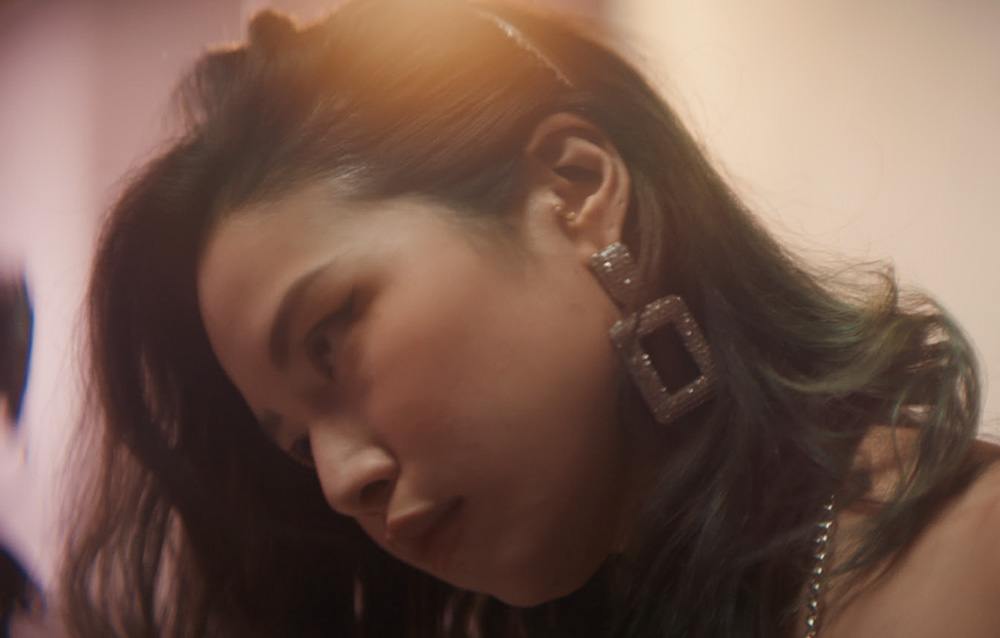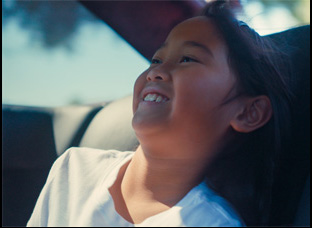“I watch how music saved this generation,” Elizabeth Ai can be saying during her unusually tender documentary “New Wave,” finding that for as soothing as the sound of cool synths, electronic drums and come hither vocals were in the songs of bands such as Modern Talking, Bad Boys Blue and C.C. Catch in the mid-1980s, they were particularly nourishing to Vietnamese ex-pats living abroad after having to flee their homeland during the war. It wasn’t only the countless lives lost that were so painful, but the broken families that resulted as relatives were scattered around the world and even those that lived in close proximity to one another might as well have been living on separate continents when in order to keep a roof over their heads, parents never got to see their kids when working all hours of the day to stay afloat in a new country.
When the topic resisted discussion amongst families when it was too painful to confront, it becomes fitting that Ai finds a way into such a complicated story through the music that once made things palatable before, bravely examining her own strained relationship with her mother as she’s becoming one herself and recalling the nights spent in her aunt and uncle’s Toyota Supra losing herself in the songs she would blast from the car’s speakers as her mom toiled away at a nail salon after her father had deserted the family. She was hardly alone in the Vietnamese American community that formed in Orange County, California where future DJ BPM, otherwise known as Ian Nguyen, and Lynda Trang Đài, a singer who was nicknamed the Vietnamese Madonna, would make careers out of what first was a passion for the music, truly turning what were cover songs at first from European bands into their own when investing the soulfulness of having sought refuge in them, and “New Wave” shows how the music brought people together when those feeling lonely on a Friday night could count on a dance hall being open.
Those doors are unlocked again in Ai’s feature directorial debut, which is as apt to move audiences in ways beyond the dance floor as she, Đài, and Nguyen reflect on how they were shaped by absence in their families and how it continues to affect the relationships they have with their own children today. Even without detailed recreations of the 1980s, complete with extras decked out with AquaNet-enhanced Flock of Seagulls coifs, “New Wave” reconciles the past and the present when a piece of history will always seem missing and what fills the void can be entirely unexpected. With the film premiering this week at Tribeca en route to DC/DOX this Saturday in Washington D.C., Ai and producer Rachel Sine graciously took time out of a whirlwind week to talk about the six-year trek to make “New Wave” a reality, how the story of a community forming around the music was paralleled by one forming around the film and taking great care to tell a story from a perspective that hasn’t been out there before.
Elizabeth Ai: In 2018. I was pregnant with my daughter and just grappling with the kinds of stories I would tell her as a second-generation Vietnamese American person who was not raised by my parents. I wasn’t going to go and rehash all the old War stories. We know what they’re like and they’re always centering white men and the Vietnamese are the villains, so I just want to tell a different story. My uncles and aunties raised me, so I thought I’ll just start there. I went to old photo albums and the first pictures I saw that jumped out at me were them with the big hair and the funky clothes. Then I just started to hear that soundtrack, so the old family photo albums really just brought me back to a time when all of my childhood memories were seeped in this music.
So I thought New Wave was where I’d start and I’ll make a music documentary. Obviously, it turned into so much more, but it’s been a six-year long journey with a lot of conversations with people like Rachel, just helping me find the courage to be able to tell my story because I’ve spent a lifetime hiding behind walls of that model minority myth that we’ve been fed. It’s just like, “Everything’s okay. You guys are great. You have so much more than the first generation. So don’t look back. Just keep looking forward and run for your life.” But in looking back, I just didn’t want to avoid the truth anymore. I could just make a who’s who of the [New Wave] music scene and where are they now, but Rachel and our teammates were like, “What are you trying to say though, Elizabeth? It feels so personal.
Rachel, when it is a personal story for Elizabeth, what does that require of you as a producer? It seems like it’s different than your average producing gig.
Rachel Sine: This was a very, very emotional process. I had worked with Elizabeth previously in an ad agency, so we had already had a working relationship and through her, I was able to learn from zero. I knew nothing about New Wave or Eurodisco music or what this community went through after the end of the Vietnam War, so it was such an amazing learning process for me. I had always grown up with “Platoon” and “Full Metal Jacket” and “Apocalypse Now” in film studies classes, so hearing her story, it was really the first time that I ever had seen a Vietnamese American perspective on the big screen.
I felt like my role here was to serve as a mirror to reflect back to Elizabeth all the things that she was feeling. And even for me, it brought up a lot of emotional feelings that maybe I buried away about my own relationship with my parents. I remember watching rough cuts, just bawling because you just feel so much for Elizabeth and her mom and what they went through. And while this is a very specific story about a very specific time and place and community, I feel that the story is so universal and coming of age, we all have problems understanding the generation that came before us, so it was like film therapy is how I’ve come to think about it.
Were you always planning to include yourself in the film?
Elizabeth Ai: I never saw myself like being in the film, at least not in the first four years of it. But it was a combination of things — my teammates were asking me to go deeper and then my daughter, who was three and change at that point, started to ask me [about] her paternal grandparents. And I had never even uttered [to myself] the words “I’m estranged from my mom,” [which] is bizarre to even say, but it was eight years of estrangement, [looking back]. Now I can tell people I was so ashamed as a daughter of refugees to think back on that trauma, and the pain that [my parents] had endured, I didn’t want to look back and they never talked to me about it, so I also didn’t have the vocabulary or language to talk about it. Going to my community and talking to my friends and talking to my colleagues and friends was a huge part of the process because they would ask me personally what was at stake for me. And my daughter asked the biggest question of all, “Where are your parents?” That was it. There was a lot of logistical things to do, but emotional things to unpack [as well].
 It all makes sense when you see it, but it really is an unusual triumvirate you end up centering the film around with yourself, Ian Nguyen and Lynda Trang Dai since you share something clearly, but had really different perspectives on it. What went into realizing your stories were the ones to focus on?
It all makes sense when you see it, but it really is an unusual triumvirate you end up centering the film around with yourself, Ian Nguyen and Lynda Trang Dai since you share something clearly, but had really different perspectives on it. What went into realizing your stories were the ones to focus on?
Elizabeth Ai: It was a long journey. Ian was one of the first people that I met, but I wasn’t sure [because] you let things unfold and you see how much they share with you over the years. It was the same with Lynda, but they were the first two interviews that I did. One of the biggest lessons [of this] was trusting your gut, so when I [thought] I’m so fascinated by these people, it ultimately ended up being Lynda and Ian when I kept wanting to spend time with them. I still pursued four dozen more interviews — and multiple interviews with at least a dozen of them, so we have 300 hours of footage.
But I thought of a framework for them in terms of like a past, present and future. I don’t mean it to be disparaging in any way to Lynda, but I do think that she is a bit stuck in her thinking process. She’s a powerful, strong woman still doing her thing, but she’s kind of lost in that past still and I’m not sure how she forges ahead. Then in terms of her regrets, Ian, I feel, is very present and he embraces this future [where] he’s like “I have this relationship with my daughter.” And then for me, I am on a future journey because my mom is still here and I see that as a chance to rebuild my relationship. We’re still having a hard time. She’s here in New York with us right now, but I’m still scared to talk to her. Even my own executive producer, Robina [Riccitiello] and Rachel are like, “What are you doing? Are you going to hang out with your mom”and I say I’m going to text, but I don’t have that reflex that most people have with their moms, so I’m still learning how to remember to text my mom and ask her how she’s feeling and I think I have a big future of healing to go.
Your aunt seems to have kept a remarkable amount of footage from the time you spent together. What was that like to resurface and dig into?
Elizabeth Ai: I would say my aunt and uncle do have a lot, but what was used in the film was very specific and we used it very judiciously because we we only had some clips that I was in, so we had to use it in parts. Then there was a lot of car footage because my uncle’s a car enthusiast [with] different cars every couple of years. He would fix up one, sell it, buy another one. So we had car footage from him, but a lot of [the discovery] was a huge, huge team effort.
Rachel Sine: Yeah, it was a huge grassroots effort through the New Wave documentary Instagram account. There was a call to action for the community to submit their own personal archives and a lot of these archives were just under someone’s mattress or sitting in a hot garage and our associate producer Mina Dolinh and the rest of our team helped to collect this archival footage, along with our archival producer and I’m really proud of what our team was able to accomplish.
You also get a brand new looking vintage Supra for the recreations. Was that difficult to get your hands on?
Rachel Sine: We actually had the hookup through Instagram.
Elizabeth Ai: I will shout out to Little Saigon Official and Chris Tan, the Gen X person who started the brand and Instagram page. He’s so nice and he started it because he didn’t want to see the first sanctioned Little Saigon fade away, so they opened up shop in this very popular mall and gathering area on Bolsa Avenue, which is the heart of Orange County for the Vietnamese and he started a little shop called Little Saigon Official that sells all kinds of wares, [from] T-shirts to ashtrays to pillows — anything with Little Saigon on it. And it’s amassed quite a following and he reached out to us [when we put the call out] and we said, “Send us pictures [for the film]. And he’s like, “Do you ever want to take pictures with a Supra? I’m like, “Yes, yes, let’s be friends.” And that’s the beginning of our friendship and they always repost and reshare our stuff, so it’s been a really incredible journey meeting folks like that from Instagram.
When you’re having to engage with the younger generation as you’re bringing them in for the recreations of the ‘80s dance scene today, what was it like to talk about the history with them?
Elizabeth Ai: The vast majority of them are Vietnamese and children of people that were either in the New Wave scene or they had uncles and aunties that were in the scene, so most of them had a touch point. But the other ones who were Asian — Korean, Chinese, and other ethnic groups — all had a touch point with New Wave, and in the process of making this film, New Wave has had a resurgence. Euro disco has been playing a lot more and there’s deejays from all over the world that are playing it now, [which] I didn’t know getting into it. I just wanted to make this film, but people are loving this music now. I’ve even seen the song by Modern Talking, “Cheri Cheri Lady” has gone viral on TikTok, just on its own [recently].
It sounds like the moment is right to be putting this out. What’s it like to get here after all these years?
Rachel Sine: It’s been a dream, just the amount of community support that we’ve seen. There was a standing ovation at the premiere night, so it’s just been thrilling and overwhelming. And we’re so excited because this coming weekend we’ll be at DC/Dox. And then we’re at the opening night film at Austin Asian American Film Festival later this month, so I’m just thrilled to finally be able to share it with the world.
Elizabeth Ai: It’s exciting, but terrifying because I’m not a very public person. I’ve been a producer for more than a dozen years, and I never saw myself on camera in this capacity, especially revealing the scariest, deepest, darkest, vulnerable parts of myself, so it’s been it’s been quite a journey. I’m so happy to have had the moment to share it with audiences that so far have really embraced it. Rachel’s been hugged a bunch and I’ve been hugged a bunch [and people] end up telling us their life stories — and they’re not just Vietnamese, but people who have had hard relationships with people in their family. Bing Liu, a filmmaker [behind “Minding the Gap”], was at one of our screenings and he [said], “You watching this film made me want to call my biological dad.”
That’s a really big statement if you’ve seen “Minding the Gap.”
Elizabeth Ai: I also want to say there are so few perspectives from the Vietnamese experience that the ones that do get shared I find are seeped in toxic masculinity — so much violence, so many graphic things from the War and this was for me something that I really wanted to do as a mother — the catalyst [for the film] was embarking on motherhood and through the stories of these child/parent relationships and learning about Lynda, [in particular], there’s so many good reasons why she’s a challenging person, but why she [specifically] struggles with motherhood and then my own with my mother, I hope that people allow this feminine perspective to surface, because I do feel like it’s time. With everything in the world that’s happening, we deserve to tell our stories.
“New Wave” will screen again at Tribeca Festival at the Village East on June 15th at 2:45 pm and June 16th at 11 am. It will also screen at DC/DOX in Washington D.C. at the Landmark E-Street Cinema on June 15th at 3 pm.





